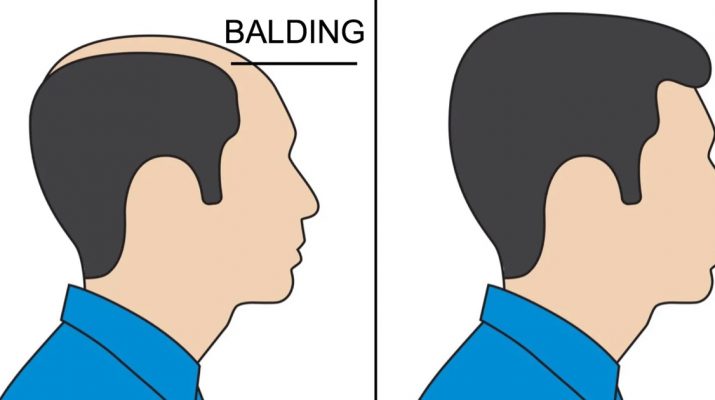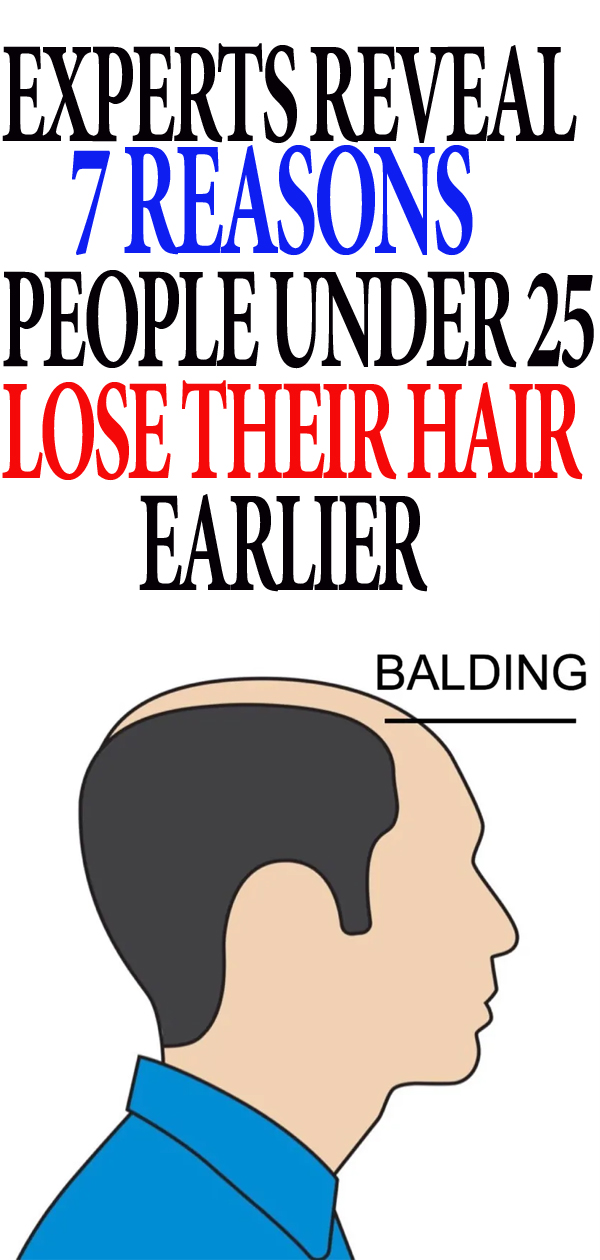“In a study of 4,000 students conducted by Tsinghua University in Beijing … almost 60 percent of respondents were found to be suffering from hair loss to some degree.”
It’s estimated that one out of every four men will begin balding by age 30; people are losing their hair from the age of 21, and those with the condition notice an obvious loss of hair by the age of 24 or 25.
What in the heck is going on?
“My feeling is that this generation is losing its hair sooner than previous generations,” says Dr. Fu Lanqin, a dermatologist at the Peking Union Medical College Hospital in Beijing, China.
But this isn’t just a China problem – it’s a global one. (Asians tend to lose their hair at a later age than Caucasians.)
Here Are Seven Reasons Why People Under The Age Of 25 Experience Premature Hair Loss:
1. Hereditary Hair Loss
Hereditary-pattern baldness (HPD) is, by far, the most commonly discussed reason for hair loss. Per Harvard Medical School, HPD “is a natural condition caused by some combination of genetics, hormone levels, and the aging process.”
Something that should grab your attention about Harvard’s description about a genetically-related condition is the other reasons for hair loss aside from genetics!
HPD is a perfect example of the conundrum that is balding and hair loss. Such an enigma has resulted in a ferocious push by doctors and companies (cha-ching!) to find a “once and for all” cure for hair loss – if such a thing indeed exists.
2. Stress
Stress from work or study is thought to contribute significantly to hair loss in China. The pressure on young people to study, work and compete in a challenging global economy can have a serious long-term effect on stress levels, according to a research study in the United Kingdom.
Compounding the stress/hair loss problem is the stress-related disorder called Trichotillomania, a recognized medical condition whereby individuals pull strands of hair when under pressure.
3. Diet
When you don’t get the necessary vitamins and minerals from your diet or supplements, hair loss can result. Also, a poor diet and rapid weight loss may lead to balding. Other dietary reasons for hair loss include not getting enough protein, and the eating disorders anorexia and bulimia.
“Eat a well-balanced diet” is a mantra that has been repeated over and over and over … but doing so may just help keep more of that precious hair on your head. So, on that note, make sure to eat plenty of whole grains, fresh fruits, and vegetables.
4. Prescription Medication
Various prescription drugs list loss of hair as one of its potential side effects. Medications thought to cause hair loss include: antidepressants, blood thinners, and beta-blockers. Birth control medications may instigate hair loss, as well as vitamin A supplements. Certain medicines for the conditions of arthritis, gout, and heart disease may also contribute to hair loss.
If you’ve noticed considerable hair loss after being prescribed any of these medicines, consult with your doctor about a possible replacement. If possible, consider gradual withdrawal from the drug or supplement (it’s advisable to wean off of prescription medications only under medical supervision due to the side effects.)
5. Immune Problems
Immune problems, such as autoimmune diseases, often results in a sudden loss of hair. One particular autoimmune disease, alopecia areata, causes the immune system to attack the chemical process that attempts to stimulate hair growth! (What next?)
Fortunately, alopecia areata can be treated. Other diseases – including diabetes, anemia, and lupus – may cause hair loss.
6. Thyroid Disorders
Any disruption to the production of thyroid hormones is considered a thyroid disorder. When your thyroid is underactive (produces too little hormone) or overactive (produces too much), it may lead to accelerated hair loss. Thyroid diseases (e.g., Hashimoto’s), which are considered autoimmune disorders, can also lead to excessive hair loss.
Treatment is available for both thyroid disorders and thyroid diseases. Proper treatment may help slow down the rate of hair loss.
7. Smoking
Besides being linked to over 50 different diseases including heart disease and lung cancer, it turns out that smoking cigarettes may worsen hair loss.
According to one Taiwanese study of over 700 men, smoking frequency is directly related to hair loss. Study participants who smoked in excess of 20 cigarettes a day were more than twice as likely to experience moderate to severe hair loss than someone who has never smoked. Physiologically, researchers believe that smoking damages the biological structure of hair follicles – the minuscule pores that stimulate hair growth.
“Can I STOP hair loss?”
Ah, yes, the question that has probably been on many minds! The answer is MAYBE. Ultimately, it depends on what kind of hair loss you’re experiencing.
Bearing in mind that hair replacement technologies are still highly questionable, it’s fair to say that there is no treatment or prevention for hair loss that is genetically programmed.
That said, we can somewhat mitigate hair loss by following the advice of medical professionals:
– Avoid damaging your hair: cut down on the use of dyes and chemicals, limit perming, and don’t pull hair too tight.
– Actively care for your hair: use mild shampoo and use a good hairbrush.
– Eat right(!): Consume a healthy diet full of whole grains, fruits, and vegetables.
– Consume the right nutrients: iron, protein, vitamin C, omega-3 fatty acids, and biotin are particularly important.
– Seek medical intervention if you notice accelerated hair loss.


